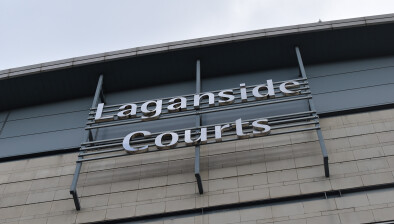NI: Court of Appeal: Ministry of Defence loses appeal against aggravated damages awarded to widow of Bloody Sunday victim
The Ministry of Defence has lost an appeal against the award of £15,000 compensatory damages and aggravated damages to the widow of Bernard McGuigan, who was shot dead on Bloody Sunday.

About this case:
- Judgment:
- Court:Court of Appeal
- Judge:Mr Justice McCloskey
Dismissing the appeal, Lord Justice Bernard McCloskey said that Mr McGuigan was capable of being a victim of the assault perpetuated by the soldiers throughout the entirety of the period under scrutiny.
He added that the attack during the whole of the episode preceding Mr McGuigan’s death “exposed the fallacy” in the MOD’s argument that the death was “instantaneous”.
Background
Bernard McGuigan was a 41-year-old father of six children when he was shot dead on Bloody Sunday, 30 January 1972.
When soldiers from the army opened fire on the civil rights march, Mr McGuigan entered Block 3 of the Rossville Flats complex and ended up taking shelter behind a telephone box at the southern gable end of Block 1.
Either to attend to another man who had been shot, or to signal to the solders to stop firing, Mr McGuigan moved out of his place of shelter. As he did so, Mr McGuigan was shot in the head and died instantly.
The Saville Inquiry determined that Mr McGuigan was the intended target of the soldier who fired the fatal shot, and raised the possibility that the round that struck Mr McGuigan was either substandard or had been deliberately tampered with so that it was more likely to fragment on impact and cause more severe injuries to the target.
High Court
In May 2014, Mr McGuigan’s widow, Bridget McGuigan Gallagher, initiated proceedings claiming damages under the Law Reform (Miscellaneous Provisions) Act (Northern Ireland) 1937 on behalf of the estate of her late husband and under the Fatal Accidents (Northern Ireland) Order 1977. Mrs McGuigan Gallagher died before the hearing but it was continued in the name of the executor of her estate, Mr Desmond Doherty.
In the High Court in April 2019, Mr Justice Gerry McAlinden explained that the financial loss aspect of the claim was “capable of resolution”, but that the Court was required to adjudicate on the following issues:
- Whether in the case of a victim who died instantly as a result of being shot, it was possible in law to make an award of aggravated damages;
- If so, whether an award should be made in this instance; and
- If so, the appropriate amount, bearing in mind the guidance which was set out in Michael Quinn v Ministry of Defence [2018] NIQB 82.
Counsel for the plaintiff argued that aggravated damages were warranted even though Mr McGuigan died instantaneously. He argued that the actions of the soldiers in the period prior to the shooting constituted part of the tort of assault/trespass to the person and those actions were such as to cause significant injury to the feelings of Mr McGuigan.
Counsel for the Ministry of Defence argued that aggravated damages were not recoverable, that “no text book on fatal accident claims contains any reference to an award of aggravated damages being made in a fatal case” and that “no reported case has been adduced by either party which deals with this matter as it is taken for granted that no such claim could ever be mounted”.
Mr Justice McAlinden said “…in the context of a wholly innocent individual who was attending his first civil rights march, who was caught up in the events of Bloody Sunday as they unfolded, who had witnessed soldiers shooting civilians, who had seen [Hugh Gilmour] being shot, who had taken shelter in an area beside the telephone box with others and who had ventured out holding his orange towel either in an attempt to tend to another man who had been shot or in an effort to indicate to the soldiers that they should stop firing, the Court can safely assume that such a person of ordinary fortitude and lack of familiarity with such conditions as those prevailing in the immediate vicinity at that time, would have been filled with fear and dread, coupled with a strong sense of indignation and hurt at being the innocent victim of a blatant, unprovoked and unjust attack by members of the army”.
Awarding aggravated damages of £15,000, Mr Justice McAlinden added that he had “…no hesitation in finding as a fact that the behaviour of the servants or agents of the MOD responsible for these wrongful acts was exceptional and contumelious and was imbued with a degree of malevolence and flagrancy which was truly exceptional”.
Court of Appeal
The MOD appealed against the award of damages and the quantum of damages. The main issue for determination in the Court of Appeal was whether aggravated damages could, as a matter of law, be awarded in the circumstances of Mr McGuigan’s death. Lord Justice McCloskey explained that damages were legally permissible under two conditions:
- There must be exceptional or contumelious conduct or motive on the part of the tortfeasor in committing the wrong or subsequent to its commission; and
- The plaintiff must suffer mental distress as a result.
Lord Justice McCloskey said that the findings of the trial judge created a matrix which extended considerably beyond the fatal shooting, and that this wider matrix (including the conduct of the soldiers in the period preceding the fatal shooting) formed part of both the express findings of the trial judge and his ensuing conclusions on the issue of recoverable damages.
Agreeing with the trial judge that the conduct of the soldiers, which was “graphically described” in the Saville Inquiry, “was capable of generating in every person of normal mental fortitude in the area a reasonable apprehension of being shot or wounded”, Lord Justice McCloskey said “whether it did so is a question of fact to be decided on a case by case basis”.
Stating that there was no legal requirement for a “factual nexus” between Mr McGuigan and the solider who shot him, Lord Justice McCloskey said “the necessary relationship, or connection, between the tortfeasor [i.e. the MOD] and the deceased was forged by the presence and conduct of multiple soldiers in the area and the presence of the deceased at the locations traversed and occupied by him from the beginning of the event until its conclusion at the location ultimately occupied by the deceased at the moment of his shooting and death, namely the open, unprotected public area in the Rossville Street vicinity where he was shot dead by a soldier.”
As a matter of law, Mr McGuigan was capable of being the victim of assault throughout the entirety of the period under scrutiny. On the facts of the case, “the threatening conduct of, and widespread shooting by, soldiers of multiple victims during the whole of the episode preceding [Mr McGuigan’s death] …exposed the fallacy in the first of the grounds in the Notice of Appeal which contended that the trial judge erred in law in awarding aggravated damages ‘in circumstances where the death of the deceased was instantaneous’”.
Considering the quantum of damages, Lord Justice McCloskey said the trial judge was under no obligation to provide a breakdown, and “his approach was clearly of the “stand back” variety” that the Court of Appeal “would not criticise in a case of this nature”. Stating that “it is precisely in this kind of situation that reticence on the part of an appellate court is appropriate”, Lord Justice McCloskey dismissed the appeal and affirmed the award of £15,000 for compensatory and aggravated damages.











